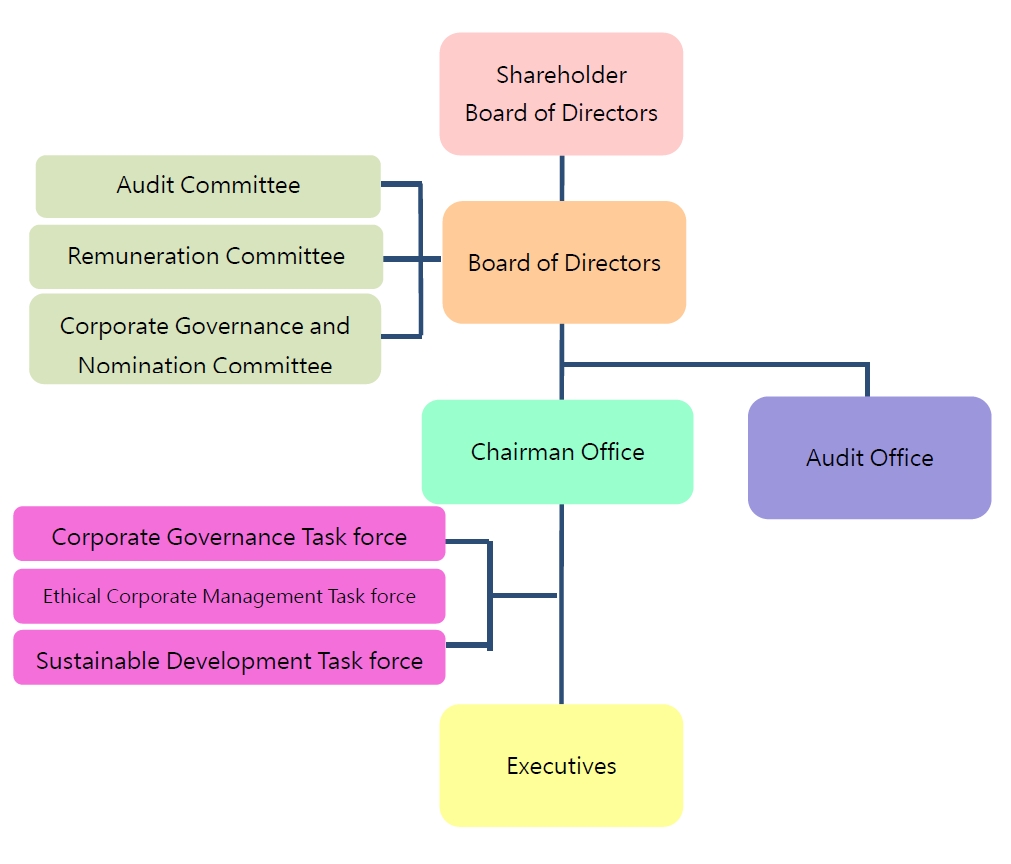- Corporate Governance Organization Structure
- Corporate Regulations
- Governance and operations of the Company
- Ethical Corporate Management
- Letter to Shareholders
- Board of Directors
- Committees
- Internal Audit Organization and Operation
- Information security governance
- Risk Management
- Summary of Communications Between Independent Directors, Chi
- Intellectual property management
- Planning and functioning of board of directors and key manag
Corporate Governance Organization Structure
Corporate governance organization structure
Corporate Governance Principles - The corporate governance system of the Company shall adhere to the following principles in addition to the relevant laws, regulations and the articles of incorporation:
I. Establish an effective corporate governance structure.
II. Protect the rights and interests of shareholders.
III. Strengthen the powers of the Board of Directors.
IV. Fulfill the function of the Audit Committee.
V. Respect the rights and interests of stakeholders.
VI. Enhance information transparency.

Corporate governance organization structure
|
Structure
|
Description
|
|
Establish internal control system
|
The Company shall follow the “Criteria Governing Establishment of Internal Control Systems by Public Reporting Companies” and take into consideration the overall operational activities of itself and its subsidiaries in the design and enforcement of an internal control system. Reviews shall be conducted on a continuous basis to ensure the continued effectiveness of the system’s design and enforcement in the light of changes in the Company’s internal and external environment.
|
|
Handling of Shareholder Suggestions or Disputes
|
To protect the rights and interests of shareholders, a spokesperson and deputy spokesperson have been appointed by the Company. The share services agent “Chinatrust Share Services Department” have also been retained to handle shareholder suggestions, queries and disputes in an appropriate manner.
|
|
Board of Directors Structure
|
The Board of Directors of the Company shall be responsible to the Company and shareholders. The procedures and arrangements of the corporate governance system shall ensure that, Board of Directors complies with the laws and regulations, the articles of incorporation, and the resolutions of shareholders meetings during the exercising of its authority.
I. Basic requirements and values: Gender, age, nationality, and culture. |
|
Independent Director System
|
The Company shall appoint no less than two independent directors in accordance with the articles of incorporation. At least one-fifth of all directors must be independent directors.
Independent directors shall possess the necessary professional knowledge. Restrictions shall apply to their shareholding and concurrent positions. They must maintain their independence during the performance of their duties, and shall have no direct or indirect interest in the Company. The professional qualifications, restrictions on both shareholding and concurrent positions held, determination of independence, method of nomination and other requirements with regard to the independent directors shall be set forth in accordance with the Securities and Exchange Act, the Regulations Governing Appointment of Independent Directors and Compliance Matter for Public Companies, and the rules and regulations of the TWSE or TPEx. |
|
Establishment of Functional Committees
|
To strengthen supervisory functions and enhance management capabilities under the corporate governance structure, the “Audit Committee” and “Remuneration Committee” shall be established by the Board of Directors based on the size of the Board an the number of independent directors for the implementation corporate governance.
۩ “Audit Committee”
۩ “Remuneration Committee” |
|
Stakeholder Section
|
The Company shall maintain open channels of communications with its banks and other creditors, employees, consumers, suppliers, local community, or other stakeholders. The Company shall also respect and protect their legal rights and interests, and set up a “Stakeholder section” on the corporate website.
The Company shall pay attention to the rights and interests of consumers, environmental protection in the local community, public interest and other topics during the course of normal business development and the maximization of shareholder returns. The Company shall also pay attention to its social responsibility. |
|
Disclosure on Corporate Governance
|
Disclosure is an important duty of the Company. The Company shall faithfully fulfill its obligations in accordance with the relevant laws, regulations, and rules of the TWSE and TPEx. The Company shall establish an Internet-based reporting system for public information, designate dedicated personnel for the collection and disclosure of Company information, and establish a spokesperson system to ensure that information that may influence the decision-making of shareholders and stakeholders can be disclosed in a proper and timely manner.
【Shareholders Meeting】https://www.pili.com.tw/investor.php?category=stock&lang=en |